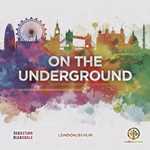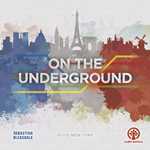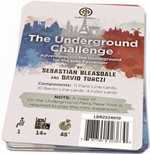
On The Underground Board Game: London And Berlin Edition
The London Underground is the world's first underground passenger railway, having opened in 1863. Its 11 lines move about 5 million passengers a day to 270 stations, along 400 km (250 mi) of track.
The massive network of London Underground stations makes up one of the most complex transportation systems in the world, and On the Underground challenges you to develop it. Build the most successful lines, connect them to landmarks and attract passenger traffic!
In On the Underground, the players build the Underground lines in London or the U-Bahn lines in Berlin. Each player controls 2-4 different lines, depending on the number of players.
On each turn, four destination cards are available, corresponding to stations on the map. You can take up to four actions; an action is either building track by placing one of your track tokens on the board or taking a branch token. A player may use two branch tokens to branch out of an existing line (whereas normally lines can be extended only at the endpoints).
After each player's turn, a passenger token is moved along players' lines, avoiding walking as much as possible, to reach one or two destinations determined at the beginning of the turn. The destination cards corresponding to the visited stations are then replaced by new ones, then the next player takes their turn.
By building track and connecting their lines to various types of stations, by building a circular line (in London), or at the end of the game if they have collected tiles from specific landmark stations (in Berlin).
By having the passenger use their lines when moving.
After all destination cards have been drawn and all players have taken the same number of turns, the game ends.
Differences from the First Edition of On the Underground

On The Underground Board Game: London And Berlin: Underground Challenge Solo Expansion
In The Underground Challenge, you will compete against real Underground lines. The map starts with multiple lines already built, and you must try to beat the Underground's score.
Much like the engineering crews of the London Underground, you must be quite resourceful at building track, and at the same time divert passengers to use your own lines, rather than the official ones.
If you can beat the Underground at its own game before the Destination cards run out, you win The Underground Challenge!

On The Underground Board Game: Paris And New York Edition
Build the most successful lines in the iconic underground networks of Paris and New York, in this stand-alone version of the classic route-building game by Sebastian Bleasdale!
In On the Underground: Paris/New York, players build the Paris Metro lines or the New York City Subway lines. Each player controls 2-4 different lines, depending on the number of players.
Building the Paris Metro network, you will need to strike the right balance between collecting sets of tokens, connecting secret destinations, blocking other players while not being blocked yourself and, of course, carrying the Passenger.
The fast paced New York map reflects the hectic pace of life in the big Apple. It encourages players to mirror real life by creating lines through Manhattan, but you have to build quickly to keep up with the always-moving Passenger.
On each turn, four destination cards are available, corresponding to stations on the map. You can take up to four actions; an action is either building track by placing one of your track tokens on the board or taking a branch token. A player may use two branch tokens to branch out of an existing line (whereas normally lines can be extended only at the endpoints). After each player's turn, a passenger token is moved along players' lines, avoiding walking as much as possible, to reach one or two destinations determined at the beginning of the turn. Destination cards corresponding to the visited stations are then replaced by new ones, then the next player takes their turn.
Players score points in two ways:
After all destination cards have been drawn and all players have taken the same number of turns, the game ends.

On The Underground Board Game: Paris And New York: Underground Challenge Solo Expansion
This mini-expansion requires a copy of On the Underground: Paris / New York to play.
In The Underground Challenge, you will compete against real Underground lines. The map starts with multiple lines already built, and you must try to beat the Underground's score.
Much like the engineering crews of the Underground, you must be quite resourceful at building track, and at the same time divert passengers to use your own lines, rather than the official ones.
If you can beat the Underground at its own game before the Destination cards run out, you win The Underground Challenge!






